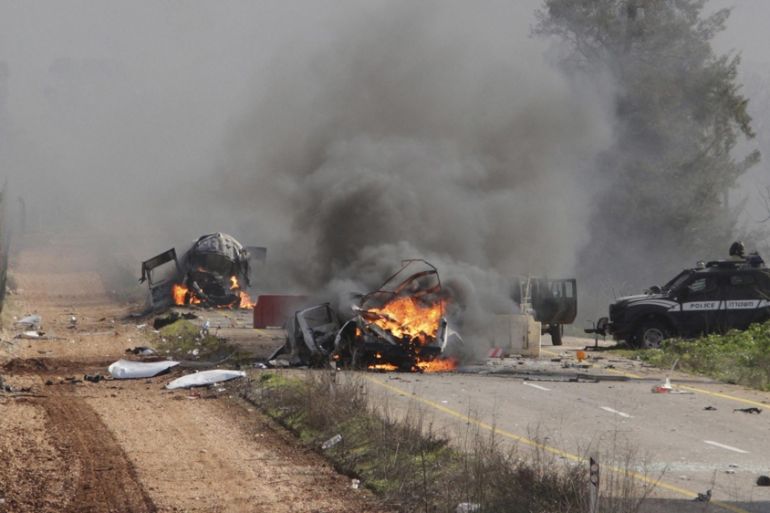Hezbollah-Israel: No war for now
Hezbollah operation was meant to restore the balance of deterrence and not engage in a full out war, analysts say.

Abbasiyeh, South Lebanon – Neither Hezbollah nor Israel are interested in engaging in a full scale war, analysts said. Hezbollah’s attack on Wednesday, the strongest since 2006, was meant to restore the balance of deterrence between the two sides, following Israel’s game changing move last week when it targeted and killed six Hezbollah operatives and an Iranian commander in Quneitra in Syria’s Golan Heights.
“The Israeli strike on Quneitra was a game changer, and Hezbollah’s response yesterday was to re-establish the deterrence it had successfully achieved since the 2006 war,” Ali Hashem, a veteran journalist and columnist who extensively covered the Lebanon-Israel conflict, told Al Jazeera.
Keep reading
list of 4 itemsMapping Israel-Lebanon cross-border attacks
What will the future bring between Hezbollah and Israel?
Cross-border fighting with Israel leaves Lebanese towns in ruins
Hezbollah’s deadly military operation on January 28, left two Israeli soldiers dead and seven wounded. A Spanish UNIFIL peacekeeper was also killed in the Israeli shelling on Lebanon.
The morning after, Lebanon’s southern border was eerily quiet.
On Thursday morning, while Israeli drones continued to hover overhead, Israeli patrols which are routinely conducted along the border in the Israeli-occupied Shebaa Farms, were noticeably absent.
Schools were open, and farmers, unfazed by the military operation, returned to work.
The message was clear; there will be no escalation, and it’s business as usual in south Lebanon.
“The operation started at 11:30am and by pm everything had gone back to normal,” said Tarek, a resident of Abbasiyeh, a village that borders Israel and overlooks the occupied Shebaa Farms. “The Israelis shelled randomly around us not hitting anything, but if they really wanted to escalate, they would’ve aimed for specific targets.”
|
|
“It’s clear they don’t want this to escalate into a war.”
The operation, which came two days before a speech expected by Hezbollah leader Hassan Nasrallah to address the Quneitra attack, is being described as “an eye for an eye” attack.
“The Hezbollah operation was equivalent to the Israeli attack. Israel hit a convoy, and Hezbollah responded by hitting a convoy,” Hashem said.
“The fact that it was conducted in the occupied Shebaa Farms is also important because this area is outside the [UN recognised] blue line, rather it is occupied territories, making it less controversial, especially for Hezbollah domestically.”
The blue line is a UN designated border demarcation between Israel and Lebanon, but does not include the Shebaa Farms, as it is still under Israeli occupation. Hezbollah has carried out several operations against Israeli military targets in the past in this area, the most recent one was in October 2014.
”The
blue line, rather in occupied territories, making it less controversial, especially for Hezbollah domestically.”]
By delivering such a bold blow to the Israelis, Hezbollah is moving to restore the balance that existed since 2006 war. If there is no response from the Israelis, analysts argue, then it means Hezbollah has conducted a successful operation to restore that balance.
And in a clear sign that shows the party’s acknowledgement of the possibility of future rounds of fighting, Hezbollah titled its statement “Statement Number One”.
As Lebanese politicians called for self-restraint, some voiced anger at the idea of being dragged into another war with Israel, saying that strategic decisions should only be the government’s prerogative.
In a statement released on Wednesday evening, the Future Movement bloc, which stands in opposition to Hezbollah, said: “No side has the right to usurp the will of the Lebanese people and replace the constitutional authority of the state that is tasked with making national decisions.”
Meanwhile, Qassem Hashem, the MP for Shebaa, visited Abbasiyeh on Thursday to inspect the border. He told Al Jazeera that southerners are used to this, and it is “the right of the resistance, and the Lebanese army, to resist occupation since Shebaa Farms are occupied”.
“We know who our enemy is, and it is our natural right to respond.”
“One thing that has emerged from Hezbollah’s attack is the message that if Israel hits Hezbollah in Syria, Hezbollah will respond,” Hashem said.
Mario Abou Zeid, a political analyst with the Carnegie Middle East Center, had qualms about describing the operation a success for Hezbollah.
According to Abou Zeid, Hezbollah’s success in ensuring the balance of deterrence lies primarily on what sort of action Israel decides to take. “And this response from Israel could take some time, as things are changing on the ground all the time,” he said.
According to Abou Zeid, the fact that the attack was launched from Lebanese territories rather than responding from the Golan Heights, where Israel’s most recent attack on Hezbollah took place, indicates that Hezbollah is not in a strong enough position there. “It seems the only possible and efficient way for Hezbollah is to strike from Lebanon.”
“It is premature to say that this was a success or failure for Hezbollah and if they were able to restore deterrence again,” he said.
As drones and fighter jets continue to circle the skies above the border, people are now waiting to see how the other side plays its hand.
“For now, the ball is in Israel’s court; it is their turn to say whether or not they want to escalate into a war,” Hashem said.